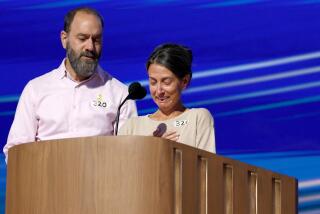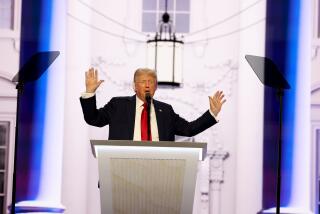Excerpts From President’s Press Conference on Taking of Hijackers
- Share via
\o7 WASHINGTON\f7 — Here are excerpts from the White House transcript of President Reagan’s meeting with reporters Friday on the capture of the four Palestinian hijackers. The President opened the session with some prepared remarks.
Events of the past 24 hours reinforce the determination of all of those who share the privileges of freedom and liberty to join together in countering the scourge of international terrorism.
All civilized peoples welcome the apprehension of the terrorists responsible for the seizure of Achille Lauro and the brutal murder of Leon Klinghoffer.
The pursuit of justice is well-served by this cooperative effort to ensure that these terrorists are prosecuted and punished for their crimes.
I want to point out the crucial role played by the Italian government in bringing this operation to a successful and peaceful conclusion.
Throughout, Prime Minister (Bettino) Craxi has been courageous in his insistence that those apprehended shall be subject to full due process of law.
I also want to note my gratitude that the government of Egypt was able to end the crisis without additional loss of life, although I disagreed with their disposition of the terrorists.
And, additionally, I wish to praise President (Habib) Bourguiba’s forthright decision to refuse the entry of the fugitives (into Tunisia).
Most of all, I am proud to be the commander in chief of the soldiers, sailors, airmen and Marines who deployed, supported and played the crucial role in the delivery of these terrorists to Italian authorities.
They, and the men and women of our foreign service and intelligence community performed flawlessly in this most difficult and delicate operation.
They have my gratitude and, I’m sure, the gratitude of all of their countrymen.
These young Americans sent a message to terrorists everywhere. The message--you can run but you can’t hide.
Question: Mr. President, Mr. President, does your action last night increase the danger for other Americans being held hostage in the Middle East?
Answer: I don’t believe so. I don’t think that there is any increase that could be made. I think that Americans are, as well as many other people from other countries, as was evidenced in the passenger list of that ship, are targets of continued terrorism. . . .
Q: Mr. President, can you tell us about your attitude now toward Egypt and can you tell us whether we intercepted this plane without any help from Egyptian authorities, either the top officials of the government or lower down, or whether in fact they did give us some sort of help?
A: Knowing that we could not risk a leak of any plans of this kind, this plan was ours. And the decision was made yesterday afternoon on Air Force One coming back from Chicago.
Q: You are telling us, sir, that Egypt then didn’t know we were going to do it and didn’t sanction it in any way?
A: Nor did the Italians know we were going to do it, as far as I am aware.
Q: Mr. President, what kind of message do you think this sends regarding your resolve? You have been criticized in the past for not taking action against terrorists. How does this fit the profile of what you think is possible, feasible, and what kind of message for the future?
A: Well, our problem in the past has not been a lack of will. Our problem has been in terrorist attacks that have taken place in the past, first of all, in a number of them, such as the terrible tragedy with the Marines (the suicide bombing of the Marine headquarters in Beirut in October, 1983, in which 241 American servicemen were killed), the perpetrators of the act went up with the bomb. They were suicides, so there wasn’t--you couldn’t--you were faced with, well, who were their collaborators, who were behind them, how do you retaliate--they’re gone.
And the other thing is in a number of incidents where to retaliate would simply be an act of violence without any knowledge that you were striking the perpetrators of the deed and you might be attacking many innocent people. This has been our great problem with terrorism.
But here was a clear-cut case in which we could lay our hands on the terrorists.
Q: Mr. President, on extradition, will you press to extradite the terrorists to the United States if the Italians do give them what you consider to be justice, knowing that there is no capital punishment in Italy?
A: Well, we think this is the proper thing to do because--I’m not a lawyer, and I don’t intend to get into too many legal areas where I might be caught short. But it is--they could be tried in both countries, and in this country they would be tried for murder, where in Italy they will be probably be tried on the basis of piracy because of the taking over of the Italian vessel.
So, this is why we have put in a request for extradition.
Q: Mr. President, there were reports that there was disagreement between yourself and Prime Minister Craxi about the disposition of these terrorists--how they’d be tried, where they’d be tried. Is there any truth to that?
A: No. We had a phone call last (Thursday) night. He told me what his situation was with regard to them, and I told him what ours was. And I told him that we would introduce an extradition request.
He told me what their legal process was with regard to that, that it wasn’t something that he could just give an opinion on himself, any more than I could if the situation was reversed. And, no, we had full cooperation.
Q: Are you angry at President Mubarak for his conduct in this whole affair?
A: No. As I say, we disagreed, but we have had too firm a relationship between our two countries and there’s too much at stake with regard to peace in the Middle East for us to let a single incident of one kind or a disagreement of this kind color that relationship.
More to Read
Get the L.A. Times Politics newsletter
Deeply reported insights into legislation, politics and policy from Sacramento, Washington and beyond. In your inbox twice per week.
You may occasionally receive promotional content from the Los Angeles Times.










